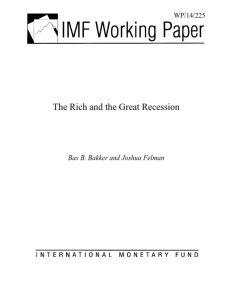Rejoignez getAbstract pour lire le résumé !

Rejoignez getAbstract pour lire le résumé !
Bas B. Bakker and Joshua Felman
The Rich and the Great Recession
IMF, 2014
Aperçu
The circle of blame for the Great Recession widens to include the wealthy.
Recommendation
Researchers Bas B. Bakker and Joshua Felman of the International Monetary Fund unearth weaknesses in the argument that middle-class borrowing and spending were the main culprits behind the Great Recession. Their research suggests that the wealthy played a much greater role in the most recent economic boom and bust, as well as in the cycles of the past three decades, than previously acknowledged. getAbstract recommends this intriguing study to readers exploring some of the less-obvious reasons behind the Great Recession.
Summary
About the Authors
Bas B. Bakker and Joshua Felman are researchers with the International Monetary Fund.

















Comment on this summary